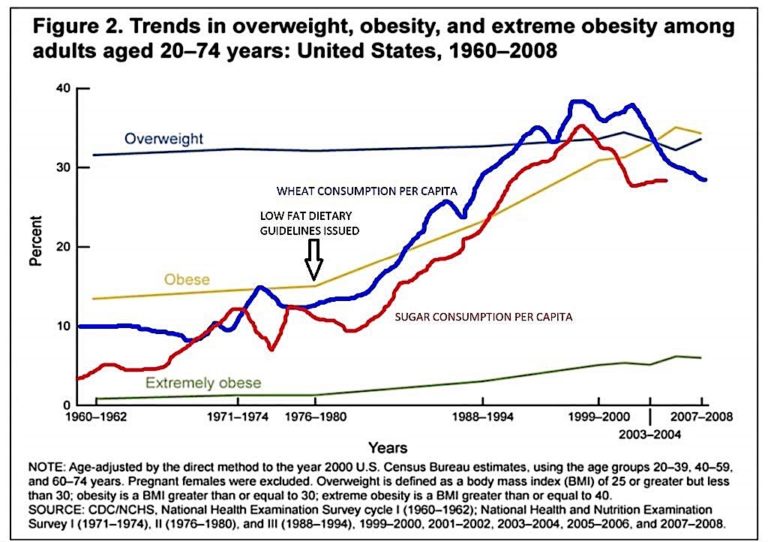Yeah, that is bullshit. As a matter of fact,
more things I eliminated, the better my health got.
Removing bread was the biggest improvement, but
removing vegetables and fruit also improved my health. So no, it wasn't "lack of non-bread things" that was an issue.
It was too much carb-heavy foods that was an issue.
And if grains are not an issue,
explain this:
You are aware that gluten intolerance test doesn't actually exist, right?
Yeah, literally everything you have written here is wrong from A to Z.
Carbohydrates
are literally sugar molecules. The only difference is that what we normally call "sugar" are really simple sugars, while carbohydrates are complex sugars. But these complex molecules are broken down into simple sugars during the digestive process, so it makes little difference whether you are eating carbs or eating white sugar straight from the store package. You see, human body cannot actually utilize carbohydrates - the only way to use carbs is to turn them into sugar.
And there is a
host of things sugar does to human body
regardless of what other nutrients may or may not be present in the food:
- Screws up hunger signals. These are based on blood sugar, and since sugar is quickly absorbed and turned into blood sugar, your blood sugar goes on a rollercoaster ride. You eat sugary food (including carbohydrates here), and you will feel hungry at most few hours later no matter how much you ate.
- Causes insulin resistance. High blood sugar can be lethal, which then causes human body to release insulin in order to get the sugar TFO of the blood and into fat cells. This by the way is what causes cravings, as rapid drop in blood sugar due to insulin causes lack of sugar in blood and thus hunger. Thing is, if you do this day-in day-out, your body gets adopted to insulin just the way it would to any drug - and besides, cells can't process infinite amounts of sugar.
- And this leads to diabetes. Diabetes is literally just insulin resistance due to high sugar food. And you can essentially cure it by throwing out all sugars and carbohydrates (so strict ketogenic diet).
- Heart and other blood system diseases. It is sugar that causes inflammatory response which in turn leads to arterial calcification. This in turn leads to stuff such as heart attack, brain attack (stroke) and so on.
- Suppresses immune system. High amount of blood sugar acts as immune suppressant, which makes you more susceptible to disease and allergies. And since sugar also feeds e.g. cancer cells, this means that people eating high-carbohydrate diets are more susceptible not just to infectious diseases, but to cancer as well. Lastly, sugar screwing with the immune system leads to autoimmune disorders, most often manifesting as inflammation.
- Liver damage. Liver is the primary organ that processes sugar, and thus major influx of sugar can overload it - and over long periods of time, cause liver damage. Liver cirrhosis is in fact more often caused by sugar than by alcohol.
- Kidney damage. High blood sugar can damage blood vessels in kidneys, and this leads to general kidney damage.
Or you can read this list by an actual nutritionist:
Or watch this video:
Yeah, and yet again, literally everything you have written is wrong.
Medieval peasants were not "bitterly impoverished" - at least not in the terms of the food they ate. In fact, their diet was significantly superior to what 99% of Westerners today eat. Medieval peasants ate a wide range of foods,
including a lot of meat and eggs. And fresh meat actually fulfills all of body's needs for vitamin C - hence why Inuits don't get scurvy. Royal Navy had an issue with scurvy because most of the meat available on long voyages was salted meet, which had lost basically all of its vitamins. Further, medieval peasants actually didn't eat that much grains at all - their primary food were various stews of meat and vegetables, supplemented by massive quantities of cheese as well as lot of eggs.

www.bristol.ac.uk
That is literally
opposite of "carb-rich nutrient-poor". In fact, Medieval peasant's diet was closer to being "nutrient-rich carb-poor", though they obviously didn't eliminate carbs.
And potato has nothing to do with medieval diet at all.
Person can be underweight
and fat though. In fact in some cases body will start metabolizing muscle mass long before it begins to metabolize fat.
So unless this is your ideal body:
Mere calorie restriction is not an answer to obesity.
And it definitely is not an answer to an unhealthy diet, which is what this thread is
supposed to be about.









